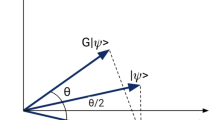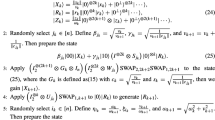Abstract
The solution of linear systems of equations is a very frequent operation and thus important in many fields. The complexity using classical methods increases linearly with the size of equations. The HHL algorithm proposed by Harrow et al. achieves exponential acceleration compared with the best classical algorithm. However, it has a relatively high demand for qubit resources, and the solution \(\left| x \right\rangle\) is in a normalized form. Assuming that the eigenvalues of the coefficient matrix of the linear systems of equations can be represented perfectly by finite binary number strings, the hybrid iterative phase estimation algorithm (HIPEA) is designed based on the iterative phase estimation algorithm in this paper. The complexity is transferred to the measurement operation in an iterative way, and thus, the demand of qubit resources is reduced in our hybrid algorithm. Moreover, the solution is stored in a classical register instead of a quantum register, so the exact unnormalized solution can be obtained. The required qubit resources in the three variants of HIPEA are different. The first variant only needs one single ancillary qubit. The number of ancillary qubits in the second variant is equal to the number of nondegenerate eigenvalues of the coefficient matrix of linear systems of equations. The third variant is designed with a flexible number of ancillary qubits. The HIPEA algorithm proposed in this paper broadens the application range of quantum computation in solving linear systems of equations by avoiding the problem that quantum programs may not be used to solve linear systems of equations due to the lack of qubit resources.






Similar content being viewed by others
References
Cai, X.D., Weedbrook, C., Su, Z.E., Chen, M.C., Gu, M., Zhu, M.J., Li, L., Le Liu, N., Lu, C.Y., Pan, J.W.: Experimental quantum computing to solve systems of linear equations. Phys. Rev. Lett. 110, 1–5 (2013). https://doi.org/10.1103/PhysRevLett.110.230501
Harrow, A.W., Hassidim, A., Lloyd, S.: Quantum algorithm for linear systems of equations. Phys. Rev. Lett. (2009). https://doi.org/10.1103/PhysRevLett.103.150502
Schleich, P.: How to solve a linear system of equations using a quantum computer, Semin. Proj. (2019) 1–35. www.mathcces.rwth-aachen.de/_media/3teaching/00projects/schleich.pdf
Shao, C.: Reconsider hhl algorithm and its related quantum machine learning algorithms. arXiv preprint arXiv:1803.01486 (2018)
Dickens, J.: Quantum Computing Algorithms for Applied Linear Algebra (2019)
Carrera Vázquez, A., Wörner, S., Hiptmair, R.: Quantum algorithm for solving tri-diagonal linear systems of equations, (2018) 1–24
Duan, B., Yuan, J., Yu, C.H., Huang, J., Hsieh, C.Y.: A survey on HHL algorithm: from theory to application in quantum machine learning. Phys. Lett. Sect. A Gen. At. Solid State Phys. 384, 126595 (2020) https://doi.org/10.1016/j.physleta.2020.126595
Preskill, J.: Quantum computing in the NISQ era and beyond. Quantum 2, 1–20 (2018). https://doi.org/10.22331/q-2018-08-06-79
Lee, Y., Joo, J., Lee, S.: Hybrid quantum linear equation algorithm and its experimental test on IBM Quantum Experience. Sci. Rep. 9, 1–12 (2019). https://doi.org/10.1038/s41598-019-41324-9
Bužek, V., Derka, R., Massar, S.: Optimal quantum clocks. Asymptot. Theory Quantum Stat. Inference Sel. Pap. (2005). https://doi.org/10.1142/9789812563071_0032
Svore, K.M., Hastings, M.B., Freedman, M.: Faster phase estimation. Quantum Inf. Comput. 14, 306–328 (2014). https://doi.org/10.26421/QIC14.3-4-7
Cleve, R., Ekert, A., Macchiavello, C., Mosca, M.: Quantum algorithms revisited, Proc. R. Soc. A Math. Phys. Eng. Sci. 454, 339–354 (1998). https://doi.org/10.1098/rspa.1998.0164
Zhou, X.Q., Kalasuwan, P., Ralph, T.C., O’brien, J.L.: Calculating unknown eigenvalues with a quantum algorithm. Nat. Photonics. 7, 223–228 (2013). https://doi.org/10.1038/nphoton.2012.360
Parasa, V., Perkowski, M.: Quantum phase estimation using multivalued logic. In: Proceedings of the 2011 41st IEEE International Symposium on Multiple-valued logic, ISMVL 2011. (2011) 224–229. https://doi.org/10.1109/ISMVL.2011.47
O'Brien, T.E., Tarasinski, B., Terhal, B.M.: Quantum phase estimation of multiple eigenvalues for small-scale (noisy) experiments. New J. Phys. (2019). https://doi.org/10.1088/1367-2630/aafb8e
Wiebe, N., Granade, C.: Efficient Bayesian phase estimation. Phys. Rev. Lett. 117(1), 010503 (2016). https://doi.org/10.1103/PhysRevLett.117.010503
O’Loan, C.J.: Iterative phase estimation. J. Phys. A Math. Theor. (2010). https://doi.org/10.1088/1751-8113/43/1/015301
Dobšíček, M., Johansson, G., Shumeiko, V., Wendin, G.: Arbitrary accuracy iterative quantum phase estimation algorithm using a single ancillary qubit: A two-qubit benchmark, Phys. Rev. A - At. Mol. Opt. Phys. 76, 1–4 (2007). https://doi.org/10.1103/PhysRevA.76.030306
Liu, X.M., Luo, J., Sun, X.P.: Experimental realization of arbitrary accuracy iterative phase estimation algorithms on ensemble quantum computers. Chin. Phys. Lett. 24, 3316–3319 (2007). https://doi.org/10.1088/0256-307X/24/12/007
Long, G.-L.: General quantum interference principle and duality computer. Commun. Theor. Phys. 45, 825 (2006). https://doi.org/10.1088/0253-6102/45/5/013
Long, G.L.: Duality Quantum Computing and Duality Quantum Information Processing. Int. J. Theor. Phys. 50, 1305–1318 (2011). https://doi.org/10.1007/s10773-010-0603-z
Shao, C., Li, Y., Li, H.: Quantum Algorithm Design: Techniques and Applications. J. Syst. Sci. Complex. 32, 375–452 (2019). https://doi.org/10.1007/s11424-019-9008-0
Wei, S., Li, H., Long, G.: A Full Quantum Eigensolver for Quantum Chemistry Simulations. Res. 2020, 1486935 (2020). https://doi.org/10.34133/2020/1486935
Jin, S., Wu, S., Zhou, G., Li, Y., Li, L., Li, B., Wang, X.: A query-based quantum eigensolver. Quantum Eng. 2, e49 (2020). https://doi.org/10.1002/que2.49
Gao, P., Li, K., Wei, S., Long, G.L.: Quantum second-order optimization algorithm for general polynomials. Sci. China Physics Mech. Astron. 64, 100311 (2021). https://doi.org/10.1007/s11433-021-1725-9
Giovannetti, V., Lloyd, S., MacCone, L.: Quantum random access memory. Phys. Rev. Lett. 100, 1–4 (2008). https://doi.org/10.1103/PhysRevLett.100.160501
Giovannetti, V., Lloyd, S., MacCone, L.: Architectures for a quantum random access memory, Phys. Rev. A At. Mol. Opt. Phys. 78, 1–9 (2008). https://doi.org/10.1103/PhysRevA.78.052310
Childs, A.M., Wiebe, N.: Hamiltonian simulation using linear combinations of unitary operations, Quantum Inf. Comput. 12, 901–924 (2012). https://doi.org/10.26421/qic12.11-12-1
Berry, D.W., Childs, A.M.: Black-box hamiltonian simulation and unitary implementation. Quantum Inf. Comput. 12, 29–62 (2012). https://doi.org/10.26421/QIC12.1-2
Nielsen, M.A., Bremner, M.J., Dodd, J.L., Childs, A.M., Dawson, C.M.: Universal simulation of Hamiltonian dynamics for quantum systems with finite-dimensional state spaces, Phys. Rev. A - At. Mol. Opt. Phys. 66, 1–12 (2002). https://doi.org/10.1103/PhysRevA.66.022317
Low, G.H., Chuang, I.L.: Optimal Hamiltonian Simulation by Quantum Signal Processing. Phys. Rev. Lett. 118, 1–5 (2017). https://doi.org/10.1103/PhysRevLett.118.010501
Santagati, R., Wang, J., Gentile, A.A., Paesani, S., Wiebe, N., McClean, J.R., Morley-Short, S., Shadbolt, P.J., Bonneau, D., Silverstone, J.W., Tew, D.P., Zhou, X., O’Brien, J.L., Thompson, M.G.: Witnessing eigenstates for quantum simulation of Hamiltonian spectra. Sci. Adv. 4, 1–12 (2018). https://doi.org/10.1126/sciadv.aap9646
Berry, D.W., Ahokas, G., Cleve, R., Sanders, B.C.: Efficient quantum algorithms for simulating sparse hamiltonians. Commun. Math. Phys. 270, 359–371 (2007). https://doi.org/10.1007/s00220-006-0150-x
Long, G.-L.: Collapse-in and Collapse-out in Partial Measurement in Quantum Mechanics and its WISE Interpretation. Sci. China Physics Mech. Astron. 64, 280321 (2021). https://doi.org/10.1007/s11433-021-1716-y
Clader, B.D., Jacobs, B.C., Sprouse, C.R.: Preconditioned quantum linear system algorithm. Phys. Rev. Lett. 110, 1–5 (2013). https://doi.org/10.1103/PhysRevLett.110.250504
Dervovic, D., Herbster, M., Mountney, P., Severini, S., Usher, N., Wossnig, L.: Quantum linear systems algorithms: a primer. arXiv preprint arXiv:1802.08227 (2018)
Funding
National natural science foundation of china,61773359,Fang Gao,61720106009,Feng Shuang,61873317,Wei Cui
Author information
Authors and Affiliations
Corresponding author
Additional information
Publisher's Note
Springer Nature remains neutral with regard to jurisdictional claims in published maps and institutional affiliations.
This work was supported by the National Natural Science Foundation of China under Grants 61773359, 61720106009 and 61873317.
Rights and permissions
About this article
Cite this article
Gao, F., Wu, G., Yang, M. et al. A hybrid algorithm to solve linear systems of equations with limited qubit resources. Quantum Inf Process 21, 111 (2022). https://doi.org/10.1007/s11128-021-03388-3
Received:
Accepted:
Published:
DOI: https://doi.org/10.1007/s11128-021-03388-3




